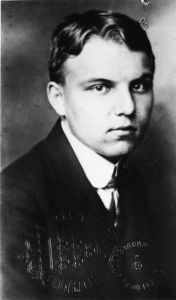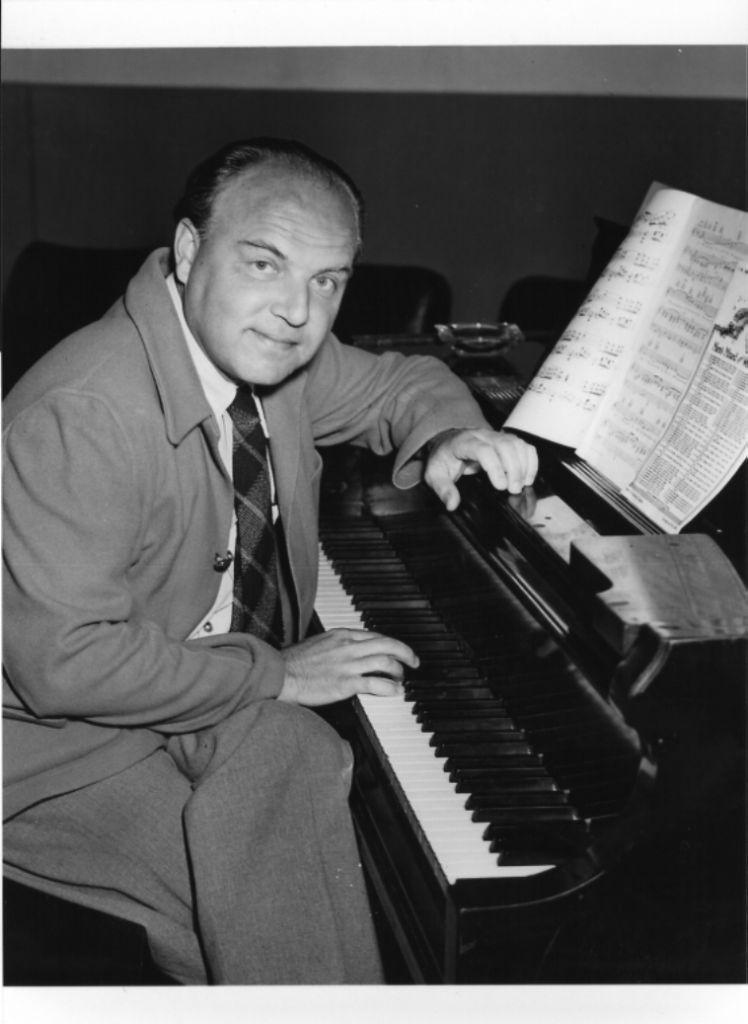23 August marked 120 years since the birth of Ernst Krenek. Born in Vienna (1900) and deceased in Palm Springs, California (1991), Krenek numbers among the 20th century’s most important and multifaceted composers—and beyond being an outstanding musician and thinker, he was also an equally great man of letters and teacher.
With the exception of some quite noteworthy, prelude-like early achievements, Ernst Krenek’s long and remarkable journey through nearly a century of music history began at that historic Viennese institution that is known today as the mdw – University of Music and Performing Arts Vienna. It was with a Suite for Piano in F Major that, at 16 years of age, he introduced himself to Franz Schreker, who admitted him to his class at the Imperial and Royal Academy with a mumbled “quite nice”, as Krenek remembered later on. To facilitate continuation of his general schooling, a special arrangement was made that allowed Krenek to skip minor subjects like ear training, conducting, and piano accompaniment and instead concentrate entirely on studying counterpoint with Schreker. As one can see from Krenek’s evaluation reports, which have been preserved, his efforts in this subject were “untiring” and his achievements “outstanding”.

© Historisches Museum Wien
Of the cannons, fugues, and double fugues that he composed as coursework, he included in his catalogue of works as Opus 1a the final double fugue (in C major)—which was also performed by his classmate Felix Petyrek in a class recital on 14 May 1918. Stylistically, this little composition reveals itself to be a reflection of those characteristic attributes that were considered modern in Vienna at that time, attributes that could also be found in the musical language of his teacher: late romantic harmonic structures and occasional hints of impressionistic sounds can be found in this elegant and assured demonstration of contrapuntal craftsmanship by Krenek.
It was not just musically but also geographically that Krenek followed in his teacher’s footsteps in 1920, when he transferred to the State Academy of Music in Berlin. There, a more progressive understanding of musical modernism soon inspired him to adopt a liberal approach to dissonance in the interest of maximising the possibilities of an expressionist musical language. Krenek’s early string quartets and symphonies, which were received somewhat sceptically by Schreker and bourgeois audiences but celebrated by proponents of the musical avant-garde, garnered him great attention—and though he was just 20 years old at the time, music encyclopaedia articles as well as music-related features in print media began mentioning him as one of the important contributors to future musical developments.
Shortly following these first atonal and expressionist successes, Krenek’s experiences of Stravinsky, Honegger, and Parisian musical life inspired him to turn away from a purely self-satisfying vein of musical modernism. The creation of new music placed Krenek in a cultural and social context—and thus in relation to the (entertainment) demands of audiences at large. Krenek, as an eminently versatile craftsman, thus returned to a musical language that was harmonically more moderate, experimented with neoclassical forms, and also—as an observer of the musical present that surrounded him—integrated into his works elements of popular American dances that were in fashion at the time. It was this development that led to the opera Jonny spielt auf, which conquered European stages with unprecedented success in the final years of the Golden Twenties.
This success, however, proved to be an extremely ambivalent experience for Krenek, and was in many respects to be a decisive turning point in his life and artistic development. Just as irritated by cheering crowds and theatre managers as he was by the proponents of the musical avant-garde who were turning away from him, Krenek retreated to Vienna in order to search for a new artistic and compositional orientation in the comparatively calm and quiet atmosphere of his hometown. The artistic integrity of figures such as Karl Kraus as well as Arnold Schönberg and his circle of students caused Krenek to re-evaluate his audience-oriented mindset, as a result of which he began channelling his creative energies with an uncompromising eye to artistic criteria. He thus departed from his established “neo-romantic” musical language, which he felt to be a dead end, and set about learning on his own to compose using twelve notes related only with one another.

© Ernst Krenek Institut Privatstiftung
In 1934, German nationalist and National Socialist intrigues in Austria prevented the world premiere of Krenek’s first twelve-tone opera Karl V., which he had composed in response to a commission by the Vienna State Opera. Krenek experienced this not just as an extreme disappointment but also as a foreboding sign of future political developments—developments that ultimately forced him to immigrate in 1938. And following his arrival in the USA, financial necessity forced Krenek to accept multiple teaching positions at various colleges and universities—which led to the unexpected discovery that he quite enjoyed teaching.
Following the conclusion of World War II, several German and Austrian music academies attempted to attract Krenek as a teacher, and one of these institutions was the Academy of Music and Performing Arts Vienna. Its president at the time, Hans Sittner, offered Krenek a permanent teaching position several times between 1949 and 1954—but neither these offers nor offers from other institutions could motivate Krenek to shift the focus of his life and career back to Europe. To him, it seemed too risky to give up what had by then become a stable and familiar life situation in his country of exile, whose citizen he had become in 1945.
Sittner’s efforts did, however, result in a course on problems of serial composition that Krenek taught during the summer semester of 1956. And the years that followed also included opportunities for guest lectures as well as events celebrating Krenek’s decadal birthdays. And finally, for Krenek’s 60th birthday, he was named an honorary member of the Academy, which—at least symbolically—brought this former student’s long journey full circle, back to the institution where it had begun.

